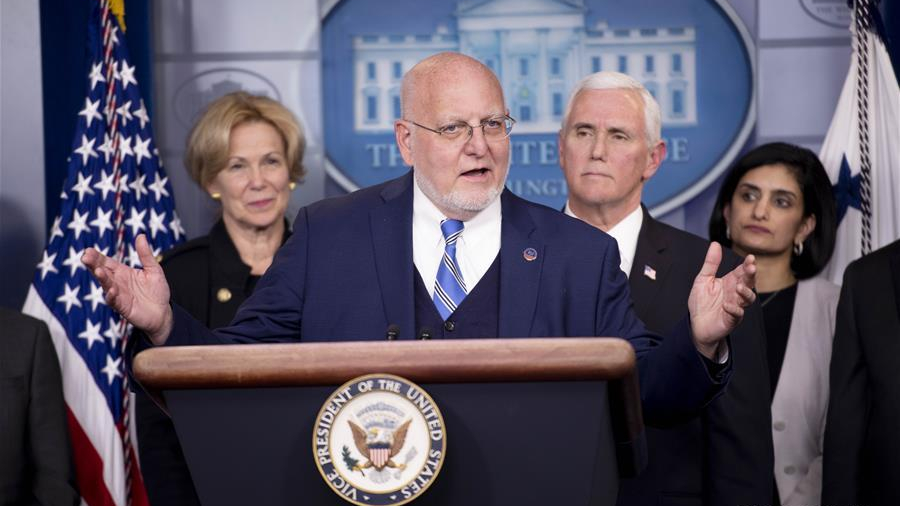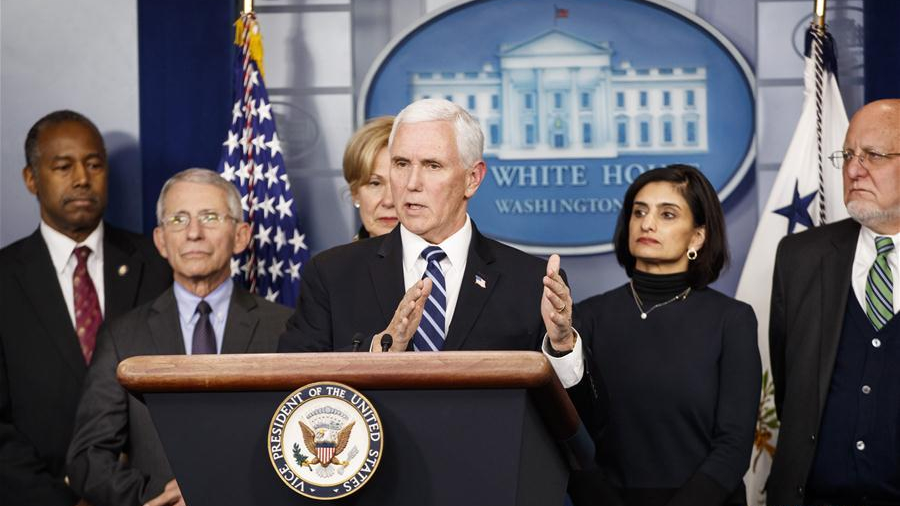
Editor's note: Tom Fowdy is a British political and international relations analyst and a graduate of Durham and Oxford universities. He writes on topics pertaining to China, the DPRK, Britain, and the U.S. The article reflects the author's opinions, and not necessarily the views of CGTN.
"The system is not really geared to what we need right now, what you are asking for. That is a failing," declared Dr. Anthony Fauci, director of the National Institute of Allergy and Infectious Diseases to the United States House of Representatives Oversight and Reform committee on Thursday. The comments echoed those made previously in the week by Robert Redfield, director of America's CDC, who criticized the lack of federal funding towards the COVID-19 outbreak, as well as low frequency, delays and a lack of resources towards testing.
The events of this day will certainly leave their mark on history. Uninspired by Trump's speech and his unprecedented ban on travelers from Europe, the Dow Jones index sunk by 10 percent, its sharpest drop in 30 years. The NBA canceled its season, Disneyland Park closed down. As catastrophe mounted, the Republican held United States senate engaged in a bloody battle against the House of Representatives over the details of a potential economic relief package designed to combat the virus, with leader Mitch McConnell slamming it as an "ideological wish list" by Nancy Pelosi over provisions such as paid sick leave.
What is the broader theme of everything going on here? In the midst of a rapidly emerging national crisis, America's political system is proving to be chaotic, leaderless, disorganized and without direction. The pathology is ideological and the diagnosis is neoliberal capitalism. The private and pluralistic American health-care system combined with a model of governance which devoutly worships the role of the market, profitability and the limited state have severely delayed and hindered the national and organizational response.
An undue focus on the role of the market positions itself at the heart of the flaws within America's health-care system which may be operationally efficient, but poorly organized on a national scale. Although subsidized by the government through given insurance programs, it is nevertheless due to the country's ultra-capitalist ideology which advocates the power of the unbridled market, left largely to the private sector to organize.

U.S. Vice President Mike Pence (front) along with members of the Coronavirus Task Force attend a press conference on the coronavirus at the White House in Washington, DC, U.S., March 4, 2020. /Xinhua
U.S. Vice President Mike Pence (front) along with members of the Coronavirus Task Force attend a press conference on the coronavirus at the White House in Washington, DC, U.S., March 4, 2020. /Xinhua
Healthcare in America is in effect a series of competing businesses and organizations whose aim is to generate a profit and thus compete with another accordingly than account for the greater public good. This style of system subsequently reduces the direct organizational control which politicians and officials hold over healthcare operations, making it more difficult to coordinate a holistic response to a given crisis.
This problem is further amplified when one looks at America's governance structure which creates an inconsistent array of differing healthcare regulations and policies across a number of states, as well as affordability problems. Evidence thus subsequently shows that these problems are what created the country's shortage of testing kits, inefficient testing standards and bureaucratic hurdles to getting tests in certain states, all which are accordingly rooted in the market principles and goals which these institutions operate.
These have been demonstrated to be at fault of a number of local outbreaks. Thus, while this may make them run efficiently in responding to individual cases, it effectively becomes a challenge to coordinate a response.
Although the presidency possesses a range of emergency powers and provisions which could strengthen the federal government's coordination and resources, Trump has notably not chosen to do this. The problem is again rooted in ideology and the principle of market non-interventionism which dictates America's health-care governance and is deeply opposed to a growing state role.
One of his core election pledges in 2016 was to end "Obamacare" that is obligating affordable health-care insurance. Although he failed to do this, the symbolism is important. Similarly, Trump dismantled the country's pandemic response mechanisms with funding cuts. While not Trump directly, we see how these ideas are blocking progress on response bills in congress, particularly concerning paid sick leave.
In this case, America's system is proving to be exceptionally sluggish, unresponsive, divided and ideologically inept in combating the COVID-19. When a health expert testifies to congress that the country is failing, that is not a light thing to say. A heavy emphasis upon the virtues of the market and autonomous governance has created significant delays to the country's response which are only being realized now, yet even there is a lingering feeling of "too little, too late" as ideology continues to stifle authorities against the common good, as we are now seeing in congress.
(If you want to contribute and have specific expertise, please contact us at opinions@cgtn.com.)